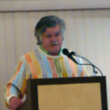Embattled rebel : Jefferson Davis as Commander in Chief
(Large Type)
LT 973.7092 MCPHE
1 available
Copies
| Location | Call Number | Status |
|---|---|---|
| Central - Adult Large Type | LT 973.7092 MCPHE | Available |
Description
More Details
Notes
Table of Contents
Subjects
Davis, Jefferson, -- 1808-1889 -- Military leadership.
Large type books.
Presidents -- Confederate States of America -- Biography.
United States -- History -- Civil War, 1861-1865 -- Biography.
United States -- History -- Civil War, 1861-1865 -- Campaigns.
Excerpt
Similar Titles From NoveList
Similar Authors From NoveList
Published Reviews
Choice Review
McPherson (emer., Princeton), a national authority on the US Civil War and its meaning in the nation's history, assesses the military leadership of Confederate President Jefferson Davis. The author does not stray far from his interpretations in earlier works on the Civil War, but he does soften some of the sharper edges in some portraits of the man. In seven chapters, the author describes and analyzes Davis's actions and reactions to events from his appointment to the executive office in 1861 to his long retreat from Richmond at the end of the war. McPherson finds that Davis's "offensive-defensive" strategy was probably the best approach possible under the circumstances; gives Davis credit for recognizing Robert E. Lee's talents and using his services extensively; argues that much of Davis's reputation as a cold, rude, and interfering administrator came mostly from disgruntled politicians and newspapermen who were offended by the president's tone; and concludes that Davis was the Confederacy's staunchest defender, even after its downfall. Davis, McPherson writes, was not the reason for Confederate defeat. Photos, maps, endnotes, no bibliography. Summing Up: Recommended. Graduate students/faculty. --Richard G. Lowe, University of North Texas
Publisher's Weekly Review
In 1865, Confederate Ordnance Chief Josiah Gorgas lamented the leadership of President of the Confederacy Jefferson Davis, wondering "where could we get a better or a wiser man?" Pulitzer Prize- and Lincoln Prize-winner McPherson (Tried by War) refuses to answer such a question, but his examination of Davis as a military commander suggests that perhaps there was not one. Davis has had many harsh critics over the years, an inevitable fate for a leader who "went down to a disastrous defeat and left the South in poverty for generations." McPherson, however, presents Davis in a relatively sympathetic manner as he explores the Confederate president's accomplishments and undertakings. McPherson places Davis's actions, which are delivered in chronological order and garnished with a dose of opinion, in the larger contexts of the war, his health and personal life, his politics, and his relationships with other major historical players. Despite the biography's dry, yet light presentation and relatively singular focus, Davis is most redeemed not by justifications for his decisions, but through an empathetic, simple understanding of his motives: namely, an admirable (if in hindsight horribly misguided) passion for the Confederacy. Maps & illus. (Oct.) (c) Copyright PWxyz, LLC. All rights reserved.
Library Journal Review
Starred Review. Could someone other than Jefferson Davis have done a better job of serving an embattled Confederacy? Many of his contemporaries on the home front and in the firing line thought so, and this perception has served to tarnish Davis's reputation for effectiveness from Fort Sumter to Appomattox, and thereafter in Civil War historiography. However, in this brilliantly nuanced biography, McPherson (Tried by War) insists that the Rebel chief executive was no mere presidential paper-pusher, detailing how Davis visited active battlegrounds and worked tirelessly against vainglorious generals such as P.G.T. Beauregard and Joseph E. Johnston while cooperating with others he favored such as Robert E. Lee and John C. Pemberton. Davis is especially commended for his opposition to Southern governors' demands for the stationing of scarce manpower along the Confederacy's extensive perimeter instead of his preference for localized troop concentrations in force. Further, the reader is reminded that Davis, despite persistently poor health, was an energetic and steadfast advocate for Confederate nationhood, the war, and slavery even subsequent to Lee's surrender. VERDICT A thoroughly objective dissection of one of the most enigmatic figures of the Lost Cause. Maps and illustrations are a great asset. Highly recommended for Civil War and military historians, students of Southern biographies, lay readers, and all libraries. [See Prepub Alert, 4/7/14.]-John Carver Edwards, Univ. of Georgia Libs., Cleveland (c) Copyright 2014. Library Journals LLC, a wholly owned subsidiary of Media Source, Inc. No redistribution permitted.
Kirkus Book Review
A seasoned Civil War historian examines the beleaguered president of the Confederacy.Did Jefferson Davis (1807/1808-1889) get a bum rap? Pulitzer Prize and two-time Lincoln Prize winner McPherson (History, Emeritus/Princeton Univ.;War on the Waters: The Union Confederate Navies, 1861-1865, 2012, etc.) reveals the degree of vitriol unleashed against the president of the Confederacy from fellow Southerners who accused him of arrogance and malice due to the fact that he could not marshal the wherewithal to win the war. Indeed, the author shows how Davis constantly had to work against the recalcitrance of generals with an exalted opinion of their own worthe.g., P.G.T. Beauregard and Joseph E. Johnstonas well as an ill-fated adoption of a politically motivated dispersed defense of troops around the perimeter of the Confederacy, rather than a more effective concentration of force. Unanimously elected as president of the Confederacy in 1861 as the Souths most accomplished military commanderhe was a graduate of West Point, veteran of the Mexican-American War and served as secretary of war for President Franklin PierceDavis, despite horrendous ill health, made the most stirring articulation for Southern secession as a safeguard against the destruction of states property in slaves and continued to rally drooping public opinion even after Gen. Robert E. Lee had surrendered at Appomattox. Davis tended to get buried in paperwork, however, while public opinion was with the generals who had defied his command or failed to actJohnston allowed Vicksburg to fall and seemed prepared to yield Richmond and Atlanta rather than fight to the finishand against the generals Davis favored, such as Braxton Bragg and John C. Pemberton. Moreover, Davis faced an undeniable manpower crisis in the form of epidemic desertions and absences without leave. McPherson concludes that Davis, a disciplined, loyal commander, was more sinned against than sinning.A fair-handed treatment from a towering historian and sterling writer. Copyright Kirkus Reviews, used with permission.
Library Journal Reviews
Had the South won the Civil War, the country would have been sundered and the awful institution of slavery maintained; its losing left the region isolated and poor. Either way, Jefferson Davis, president of the Confederate States of America, does not look good. Here, the Pulitzer Prize-winning author of Battle Cry of Freedom aims to put Davis in a different light as an exemplary military commander.
[Page 57]. (c) Copyright 2014. Library Journals LLC, a wholly owned subsidiary of Media Source, Inc. No redistribution permitted.Library Journal Reviews
Could someone other than Jefferson Davis have done a better job of serving an embattled Confederacy? Many of his contemporaries on the home front and in the firing line thought so, and this perception has served to tarnish Davis's reputation for effectiveness from Fort Sumter to Appomattox, and thereafter in Civil War historiography. However, in this brilliantly nuanced biography, McPherson (Tried by War) insists that the Rebel chief executive was no mere presidential paper-pusher, detailing how Davis visited active battlegrounds and worked tirelessly against vainglorious generals such as P.G.T. Beauregard and Joseph E. Johnston while cooperating with others he favored such as Robert E. Lee and John C. Pemberton. Davis is especially commended for his opposition to Southern governors' demands for the stationing of scarce manpower along the Confederacy's extensive perimeter instead of his preference for localized troop concentrations in force. Further, the reader is reminded that Davis, despite persistently poor health, was an energetic and steadfast advocate for Confederate nationhood, the war, and slavery even subsequent to Lee's surrender. VERDICT A thoroughly objective dissection of one of the most enigmatic figures of the Lost Cause. Maps and illustrations are a great asset. Highly recommended for Civil War and military historians, students of Southern biographies, lay readers, and all libraries. [See Prepub Alert, 4/7/14.]—John Carver Edwards, Univ. of Georgia Libs., Cleveland
[Page 126]. (c) Copyright 2014. Library Journals LLC, a wholly owned subsidiary of Media Source, Inc. No redistribution permitted.Publishers Weekly Reviews
In 1865, Confederate Ordnance Chief Josiah Gorgas lamented the leadership of President of the Confederacy Jefferson Davis, wondering "where could we get a better or a wiser man?" Pulitzer Prize– and Lincoln Prize–winner McPherson (Tried by War) refuses to answer such a question, but his examination of Davis as a military commander suggests that perhaps there was not one. Davis has had many harsh critics over the years, an inevitable fate for a leader who "went down to a disastrous defeat and left the South in poverty for generations." McPherson, however, presents Davis in a relatively sympathetic manner as he explores the Confederate president's accomplishments and undertakings. McPherson places Davis's actions, which are delivered in chronological order and garnished with a dose of opinion, in the larger contexts of the war, his health and personal life, his politics, and his relationships with other major historical players. Despite the biography's dry, yet light presentation and relatively singular focus, Davis is most redeemed not by justifications for his decisions, but through an empathetic, simple understanding of his motives: namely, an admirable (if in hindsight horribly misguided) passion for the Confederacy. Maps & illus. (Oct.)
[Page ]. Copyright 2014 PWxyz LLCReviews from GoodReads
Citations
McPherson, J. M. (2015). Embattled rebel: Jefferson Davis as Commander in Chief . Thorndike Press, a part of Gale, Cengage Learning.
Chicago / Turabian - Author Date Citation, 17th Edition (style guide)McPherson, James M.. 2015. Embattled Rebel: Jefferson Davis As Commander in Chief. Waterville, Maine: Thorndike Press, a part of Gale, Cengage Learning.
Chicago / Turabian - Humanities (Notes and Bibliography) Citation, 17th Edition (style guide)McPherson, James M.. Embattled Rebel: Jefferson Davis As Commander in Chief Waterville, Maine: Thorndike Press, a part of Gale, Cengage Learning, 2015.
Harvard Citation (style guide)McPherson, J. M. (2015). Embattled rebel: jefferson davis as commander in chief. Waterville, Maine: Thorndike Press, a part of Gale, Cengage Learning.
MLA Citation, 9th Edition (style guide)McPherson, James M.. Embattled Rebel: Jefferson Davis As Commander in Chief Thorndike Press, a part of Gale, Cengage Learning, 2015.
































